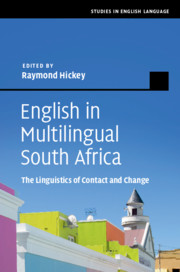Book contents
- English in Multilingual South Africa
- Studies in English Language
- English in Multilingual South Africa
- Copyright page
- Contents
- Figures
- Maps
- Tables
- Contributors
- Preface
- I A Framework for English in South Africa
- II Sociolinguistics, Globalisation and Multilingualism
- III Language Interfaces
- Chapter 12 Present-Day Afrikaans in Contact with English
- Chapter 13 Shift Varieties as a Typological Class?
- Chapter 14 Language Use and Language Shift in Post-Apartheid South Africa
- Chapter 15 English Prepositions in isiXhosa Spaces: Evidence from Code-Switching
- Chapter 16 Aspects of Sentence Intonation in Black South African English
- Chapter 17 The Development of Cognitive-Linguistic Skills in Multilingual Learners: A Perspective of Northern Sotho–English Children
- Chapter 18 Linguistic Interference in Interpreting from English to South African Sign Language
- Timeline for South African History
- Glossary
- Index
- References
Chapter 12 - Present-Day Afrikaans in Contact with English
from III - Language Interfaces
Published online by Cambridge University Press: 07 November 2019
- English in Multilingual South Africa
- Studies in English Language
- English in Multilingual South Africa
- Copyright page
- Contents
- Figures
- Maps
- Tables
- Contributors
- Preface
- I A Framework for English in South Africa
- II Sociolinguistics, Globalisation and Multilingualism
- III Language Interfaces
- Chapter 12 Present-Day Afrikaans in Contact with English
- Chapter 13 Shift Varieties as a Typological Class?
- Chapter 14 Language Use and Language Shift in Post-Apartheid South Africa
- Chapter 15 English Prepositions in isiXhosa Spaces: Evidence from Code-Switching
- Chapter 16 Aspects of Sentence Intonation in Black South African English
- Chapter 17 The Development of Cognitive-Linguistic Skills in Multilingual Learners: A Perspective of Northern Sotho–English Children
- Chapter 18 Linguistic Interference in Interpreting from English to South African Sign Language
- Timeline for South African History
- Glossary
- Index
- References
Summary
Afrikaans has been in contact for the past two centuries. Such contact and its linguistic effects have often been interpreted as a threat to the vitality or linguistic integrity of the Afrikaans language. Code-switching and code-mixing are an area of extensive influence and serve as an overt identity marker for many Afrikaans speakers, most particularly its Coloured native speakers in the Western Cape. Vocabulary borrowing, including loan translation, occur in areas where speakers of Afrikaans come into contact with a changing world through English, in domains such as government, industry, sport and entertainment, and modern technology. Grammatical changes under English influence are attested in areas where Afrikaans experiences ongoing change away from its Dutch input forms, but also show creativity on the part of Afrikaans speakers, and not simple adoption of English patterns, for instance in complementiser constructions, newly grammaticalised demonstratives, and pronominal uses of een ‘one’.
- Type
- Chapter
- Information
- English in Multilingual South AfricaThe Linguistics of Contact and Change, pp. 241 - 264Publisher: Cambridge University PressPrint publication year: 2019
References
- 4
- Cited by

